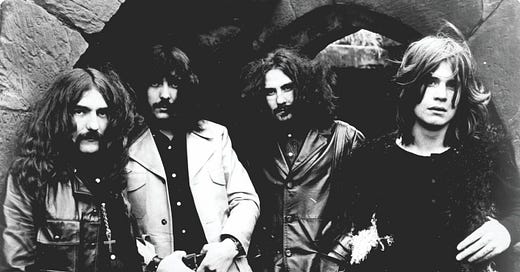BLACK SABBATH
Today's the grand finale. In 2016 I wrote about Sabbaff/HM history in Record Collector when they were playing their first farewell tour (inc. 55 years ago seeing them play to 30 diehards in our club)
BLACK SABBATH
FEBRUARY 9 1970: It’s a rainy Monday night in Aylesbury and the tiny Ex-Serviceman’s Club which houses the town’s weekly Friars club seems under some kind of deafening bombardment when I stumble in expecting to see American blues giant Freddie King. According to a sheet of paper stuck on the door, King had been forced to pull out. Instead, a small handful of club regulars have shelled out around 30p for a new band only John Peel listeners might have had heard of called Black Sabbath. Seething with apocalyptic dread when not heading into Cream-like improvisatory stretches, they sound like Hell’s house band celebrating the end of the world.
Going against prevalent hippie fashions, the band sport scuffed black attire, and the odd big silver cross. Under stark white lights and frequent strobe salvos from the Optic Nerve lightshow, the moustachioed guitarist coolly extracts blistering solo runs and juggernaut riffs from his Gibson SG, the drummer seems bent on hammering his kit through the floorboards with psychotic glee and the bass belches like the foghorn rectum of a blue whale after consuming a battleship. Over this monstrous behemoth churn, the manic-looking singer intones and howls from under his whirling hair, although a distinct Brummie accent peppers his stage announcements.
At the age of 15 turned a few months earlier, I was obsessed with what some called leaping and others called “idiot dancing”. This involved flinging limbs in all directions while jumping up and down in an extreme precursor to punk’s comparatively pogoing, designed to be acted in your own solitary space. The suitability of a band’s music for such manic action could judge them and earn audience approval at this particular club and there were several mad-flapping individuals appreciating the extra space in the sparse crowd (although those heaving evil riffs often stoked more of a slow zombie lollop). Although the band had already done a Peel session the previous November, Black Sabbath’s self-titled debut album had only been released four days earlier (on Friday the 13th, naturally). Although it was still early days, this spooky-looking Birmingham quartet had unleashed a malevolent new strain of underground rock which would rapidly infest the whole world after it became known as heavy metal.
Next day at school, one particularly evil doom-riff was on endless repeat in my head, through the incessant ringing in my ears, which was usual for a Tuesday morning. I had to hear it again so, after school, tore up to the local record shop where that debut album glowered from the bins in its sinister gatefold cover depicting a ghostly female in front of a dark old house. Standing in the booth after asking to hear the album, I trembled with anticipation as the atmospheric tolling bells and rolling thunder heralded The Riff. Only three chords but slammed down with monolithic power and demonic intensity. I duly shelled out for the album and could now relive much of the set they played the previous night.
At the time, little was known about Black Sabbath, who had not played much outside of their native city and had received little coverage in the weekly music papers which served as our lifeline to new developments. Their last minute Friars show came two weeks after Mott The Hoople had invaded, predicting punk with the riotous stage act which would make them the most notorious band in Britain. Coming weeks would see local debuts from Hawkwind, the Crazy World of Arthur Brown, Edgar Broughton and some unknown bunch of nice public school boys called Genesis. All these shows were seismic in their own way, respectively blasting out blueprints for space-rock, the lingering psychedelic explosion, politicised counterculture protest and nascent prog but, looking back now, it was Sabbath who unwittingly laid the loudest and most resonant future template. They might have played to the club’s smallest audience yet that rainy Monday night but would soon become one of the well-known of all the bands playing the UK’s obscenely healthy club circuit of that time before ascending to become one of the biggest bands on the planet; a position they would hold on to through changing lineups, frequent splits and the astronomical success of their singer. 46 years after that night, Sabbath have embarked on their farewell world tour, suitably tagged The End and running around the world to end with a final stretch in the US this autumn.
Keep reading with a 7-day free trial
Subscribe to Kris’s Substack to keep reading this post and get 7 days of free access to the full post archives.



